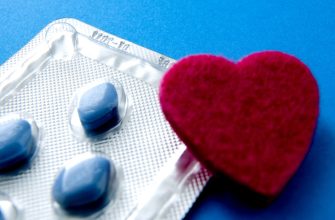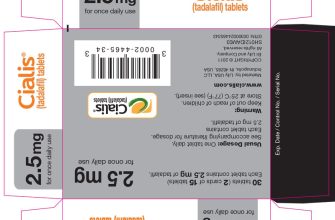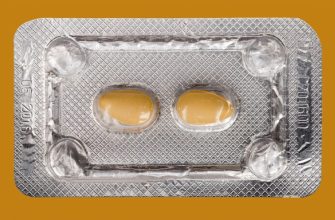Take Cialis exactly as prescribed by your doctor. The typical starting dose is 10 mg, taken as needed, at least 30 minutes before sexual activity. Don’t exceed the maximum recommended dose of 20 mg in a 24-hour period.
Dosage adjustments may be necessary based on individual response and underlying health conditions. Your doctor will guide you on the appropriate dosage and frequency. Factors like age, liver or kidney function, and other medications you’re taking can influence the recommended dose.
Always follow your physician’s instructions carefully. Incorrect use can reduce effectiveness or potentially cause side effects. If you experience any adverse reactions, such as severe headaches, vision changes, or chest pain, seek immediate medical attention.
Important Note: Cialis is not intended for daily use unless specifically prescribed by your doctor. It’s designed for use as needed, prior to anticipated sexual activity. Regular consumption without a doctor’s recommendation may lead to adverse health effects.
For further information, consult the detailed patient information leaflet provided with your prescription or contact your doctor or pharmacist. They can answer any questions and address any concerns regarding Cialis use and its potential interactions with other medications.
- Directions for Cialis Use
- Dosage and Timing
- Possible Side Effects
- Interactions
- Storage
- Missed Dose
- Further Information
- Understanding Cialis Dosage
- Factors Influencing Dosage
- Recommended Dosage Schedule
- Possible Side Effects and Dosage Adjustments
- Dosage Comparison Table
- Additional Considerations
- Timing Your Cialis Dose for Optimal Results
- Taking Cialis with or without Food
- Impact of Food on Absorption
- Recommendations for Optimal Results
- Addressing Individual Circumstances
- Additional Tips
- Possible Side Effects and What to Do
- Less Common Side Effects
- Important Interactions with Other Medications
- Alpha-Blockers and Cialis
- Other Potential Interactions
- Cialis and Alcohol Consumption: A Cautious Approach
- Understanding the Interaction
- Recommended Limits
- Potential Side Effects
- When to Seek Medical Attention
- Remember
- How to Store Cialis Properly
- When to Consult Your Doctor Regarding Cialis
- Specific Situations Requiring Medical Consultation
Directions for Cialis Use
Take Cialis exactly as prescribed by your doctor. The typical dose is 10 mg, taken as needed, at least 30 minutes before sexual activity. However, your doctor may adjust this based on your individual needs and response to the medication.
Dosage and Timing
Don’t exceed the maximum recommended dose of 20 mg in a 24-hour period. Cialis can be taken with or without food, but avoid grapefruit or grapefruit juice, as it can interact with the medication and affect its effectiveness. For daily use, your doctor will prescribe a lower dose, usually 2.5 mg or 5 mg, taken at approximately the same time each day.
Possible Side Effects
Common side effects include headache, flushing, nasal congestion, muscle aches, and back pain. These are usually mild and temporary. More serious side effects are rare but require immediate medical attention. These include sudden vision loss, hearing loss, prolonged erection (priapism), and chest pain. Consult your doctor immediately if you experience any of these.
Interactions
| Medication Type | Interaction |
|---|---|
| Nitrates | Dangerous interaction; avoid concurrent use. |
| Alpha-blockers | Potential for low blood pressure; doctor should monitor. |
| Other ED medications | Avoid concurrent use. |
Storage
Store Cialis at room temperature, away from moisture and direct sunlight. Keep it out of reach of children and pets.
Missed Dose
If you miss a dose of Cialis for daily use, take it as soon as you remember, unless it’s almost time for your next dose. Do not take two doses at once. For as-needed use, only take a dose when you plan on sexual activity.
Further Information
This information is not a substitute for professional medical advice. Always consult your doctor or pharmacist for personalized guidance regarding Cialis use and potential risks. They can provide tailored advice based on your health history and current medications.
Understanding Cialis Dosage
Cialis comes in different strengths: 2.5mg, 5mg, 10mg, and 20mg. Your doctor will determine the right dose for you based on your individual needs and health conditions. Start with the lowest dose and adjust as needed, under your doctor’s supervision.
Factors Influencing Dosage
Several factors influence the appropriate Cialis dosage. These include your age, overall health, and the severity of your erectile dysfunction (ED) or benign prostatic hyperplasia (BPH) symptoms. Kidney or liver problems can also affect how your body processes Cialis, requiring a lower dose.
Recommended Dosage Schedule
Cialis is typically taken as needed, approximately 30 minutes before sexual activity. However, a low daily dose (2.5mg or 5mg) can be prescribed for consistent treatment of ED. Always follow your doctor’s instructions on timing and frequency. Don’t exceed the recommended dose.
Possible Side Effects and Dosage Adjustments
Common side effects include headache, flushing, nasal congestion, and muscle aches. If you experience severe side effects, contact your doctor immediately. They might adjust your dose or suggest an alternative treatment.
Dosage Comparison Table
| Dosage (mg) | Typical Use | Notes |
|---|---|---|
| 2.5 | Daily use for ED or BPH | Lower dose for those sensitive to side effects or with certain medical conditions. |
| 5 | Daily use for ED or BPH, or as-needed | More common daily dosage, also used as-needed. |
| 10 | As-needed for ED or BPH | Intermediate dosage for as-needed use. |
| 20 | As-needed for ED | Higher dosage, used only in specific cases. |
Additional Considerations
Never share your Cialis prescription with others. Always consult your doctor before starting or changing your Cialis dosage. They can help you find the right dose to effectively manage your condition while minimizing potential side effects. Remember, this information is for educational purposes only, and should not replace advice from a healthcare professional.
Timing Your Cialis Dose for Optimal Results
Take Cialis at least 30 minutes before anticipated sexual activity. This allows sufficient time for the medication to reach peak concentration in your bloodstream.
For best results, avoid taking Cialis with a high-fat meal. Fatty foods can slow absorption, delaying the onset of effects. A light meal or snack is preferable.
Cialis’s effects can last up to 36 hours. Plan your dosage accordingly, avoiding repeated doses within this timeframe. Overdosing isn’t recommended and can lead to undesirable side effects.
Alcohol consumption can interact with Cialis, potentially reducing its effectiveness and increasing the risk of side effects. Moderate your alcohol intake or avoid it entirely on the day you plan to take Cialis.
Individual responses to Cialis vary. Experiment to determine the optimal timing for your body. Note the time it takes to feel the effects and adjust future doses accordingly. Consult your doctor if you have questions or concerns.
Remember: Always follow your doctor’s instructions and read the medication guide provided with your prescription.
Taking Cialis with or without Food
You can take Cialis with or without food. However, taking it with a high-fat meal may slightly delay the onset of effects.
Impact of Food on Absorption
While Cialis works effectively regardless of food intake, a fatty meal can slow down the absorption rate into your bloodstream. This means you might experience the effects a little later than if you took it on an empty stomach.
Recommendations for Optimal Results
- For faster onset of effects, consider taking Cialis on an empty stomach or with a light meal.
- If you prefer to take it with food, opt for a meal that’s relatively low in fat.
- Maintain consistency. If you choose to take it with food, continue doing so for predictable results.
Addressing Individual Circumstances
Ultimately, the best time to take Cialis is determined by individual factors and preferences. If you have any questions or concerns about how food might affect your medication, consult your doctor or pharmacist.
Additional Tips
- Always follow your doctor’s prescribed dosage and instructions.
- Be aware of potential side effects and seek medical attention if necessary.
- Store Cialis according to the instructions on the label.
Possible Side Effects and What to Do
Experience headache, flushing, or nasal congestion? These are common Cialis side effects, usually mild and temporary. Drink plenty of water and rest; they often resolve on their own. If they persist or worsen, contact your doctor.
Muscle aches or back pain are also possible. Over-the-counter pain relievers like ibuprofen or acetaminophen may provide relief. However, always check with your doctor before combining medications.
Less Common Side Effects
Dizziness or lightheadedness can occur. Avoid activities requiring alertness, like driving, until you know how Cialis affects you. Seek medical attention if dizziness is severe or prolonged.
Changes in vision, including blurred vision or temporary blue-tinged vision, have been reported. If you experience significant vision changes, consult your ophthalmologist immediately.
A prolonged or painful erection (priapism) is a serious side effect requiring immediate medical help. This is a medical emergency.
This information isn’t exhaustive. Always review the complete medication guide provided with your prescription and discuss any concerns with your healthcare provider. They can offer personalized advice based on your individual health history.
Important Interactions with Other Medications
Always inform your doctor about all medications you are taking, including over-the-counter drugs, supplements, and herbal remedies. Cialis can interact negatively with nitrates, often found in medications for chest pain (angina). This combination can cause a dangerous drop in blood pressure. Avoid using Cialis if you’re taking nitrates.
Alpha-Blockers and Cialis
Alpha-blockers, prescribed for high blood pressure or prostate problems, can also interact with Cialis. Combining them may significantly lower blood pressure, potentially leading to dizziness or fainting. Your doctor should carefully monitor your blood pressure if you’re taking both.
Other Potential Interactions
Certain antifungals, HIV medications, and antibiotics can affect how Cialis is processed by your body. Discuss potential interactions with your doctor or pharmacist before combining Cialis with any other medication. They can assess the risks and help you manage them safely.
Cialis and Alcohol Consumption: A Cautious Approach
Avoid combining Cialis with excessive alcohol. Moderate alcohol consumption may not significantly impact Cialis’s effectiveness, but heavy drinking can lead to undesirable side effects.
Understanding the Interaction
Alcohol can lower blood pressure, an effect that Cialis also produces. This combination might cause your blood pressure to drop too low, resulting in dizziness, fainting, or even more serious complications. The severity depends on factors like your individual health, the amount of alcohol consumed, and the Cialis dosage.
Recommended Limits
- Consult your doctor: They can provide personalized guidance based on your health status and medication history. This is especially crucial if you have pre-existing heart conditions.
- Limit alcohol intake: If you choose to drink alcohol while taking Cialis, keep it to one or two standard drinks. This reduces the risk of adverse interactions.
- Space out consumption: Do not take Cialis and consume alcohol simultaneously. Allow several hours between alcohol consumption and taking Cialis to minimize the risk of negative effects.
- Monitor your blood pressure: If you experience any symptoms like dizziness or lightheadedness, stop drinking immediately and contact your healthcare provider.
Potential Side Effects
- Increased risk of low blood pressure
- Headache
- Dizziness
- Flushing
- Heart palpitations
When to Seek Medical Attention
Seek immediate medical assistance if you experience severe dizziness, chest pain, or difficulty breathing after consuming alcohol while taking Cialis. These could indicate serious complications requiring immediate treatment.
Remember
Always follow your doctor’s instructions and prioritize your safety. Open communication with your physician about your alcohol consumption habits is essential for managing your Cialis treatment effectively and safely.
How to Store Cialis Properly
Keep Cialis in its original container at room temperature, between 68°F and 77°F (20°C and 25°C).
Protect your tablets from moisture and excessive heat. Avoid storing them in the bathroom or near sinks, showers, or other damp areas.
- Direct sunlight can degrade the medication. Keep the container out of direct sunlight.
- Extreme temperatures, both hot and cold, can affect the potency and stability of Cialis. Avoid extreme temperature fluctuations.
- Keep Cialis out of reach of children and pets.
Do not store Cialis in a freezer or refrigerator.
- Check the expiration date printed on the label. Do not use Cialis after the expiration date.
- If you notice any changes in the appearance of your tablets–such as discoloration or unusual odor–discard them and contact your doctor or pharmacist for a replacement.
Proper storage helps ensure the medication’s efficacy. Following these guidelines maintains Cialis’s potency and effectiveness.
When to Consult Your Doctor Regarding Cialis
Contact your doctor immediately if you experience chest pain, irregular heartbeat, or sudden vision loss while using Cialis. These could be serious side effects requiring immediate medical attention.
Specific Situations Requiring Medical Consultation
Schedule a consultation with your doctor before starting Cialis if you have heart problems, high or low blood pressure, kidney disease, liver disease, a history of stroke, or if you’re taking nitrates or other medications that interact with Cialis. Discuss your current medications, including over-the-counter drugs and supplements, to prevent potential interactions. If you have a bleeding disorder or blood cell problems, a consultation is necessary. Also, consult your doctor if Cialis doesn’t work effectively for you or if you experience persistent side effects. Remember to be honest and thorough when discussing your health history.
If you are over 65 or have a pre-existing condition, it’s vital to speak with your physician to adjust dosages safely and effectively.







